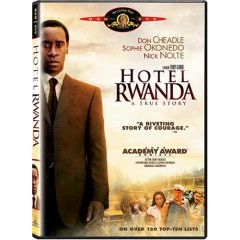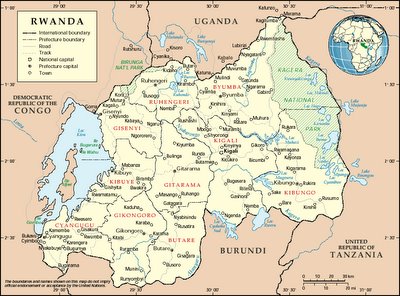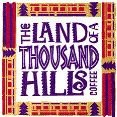 This weekend, I watched “Hotel Rwanda”. It is an excellent movie that portray an incredibly tragic situation. The genocide in Rwanda took place starting in April of 1994 and lasted for 100 days. By the time it was over, nearly one million Rwandans had been murdered.
This weekend, I watched “Hotel Rwanda”. It is an excellent movie that portray an incredibly tragic situation. The genocide in Rwanda took place starting in April of 1994 and lasted for 100 days. By the time it was over, nearly one million Rwandans had been murdered.The movie gives the details about what happened at the Hotel Mille Collines l in Kigali, the Rwandan capital, during the genocide. The heroic actions of Paul Rusesabagina, the assistant hotel manager, saved the lives of over 1,200 Rwandans who took refuge at the hotel.
The Economist describes the genocide:
Nearly 10% of the population was killed in the span of 100 days.
IT WAS the purest genocide since 1945, and perhaps the single greatest act of evil since Pol Pot turned Cambodia into a killing field.
Outsiders often assume that the genocide sprang spontaneously from primeval ethnic antagonism. On the contrary, it was planned over many months—Mr Bagosora sketched out part of the programme in his appointment book in early 1993. Militias had to be organised, machetes bought and distributed, and Hutu peasants persuaded, through skilful propaganda, that all Tutsis were their enemies. The opportunity came on April 6th 1994, when Rwanda's Hutu president was assassinated. Mr Bagosora and his co-conspirators seized control of one of the world's most authoritarian states, the whole apparatus of which was then turned to mass murder.
Rwanda is still healing from its wounds. I heard Rwandan Bishop John Ruchynana speak here in DC last month about the process of healing and reconciliation in Rwanda. He is working with prisoners to try to offer forgiveness. Without this, Bishop Ruchynana said Rwanda cannot go forward. The country faces tremendous tension between the Hutus and the Tutsis, many of the perpetrators of the genocide live with tremendous guilt and shame (suicides are common), and survivors are living with bitterness and anguish. Forgiveness is needed to be given and to be received in order for Rwanda to move forward towards a better future.

(click map for larger view)
This movie connects with me in a unique way as I am now attending an Anglican church in DC that is under the Archbishop of Rwanda, making us technically a Rwandan church. I am also working as part of the Enterprise Africa team, researching the rise of the specialty coffee industry in Rwanda and the economics of reconciliation through the Mercatus Center. This is part of my graduate responsibilities for my PhD program at George Mason. My research director, Karol Boudreax, just returned from Rwanda a few days ago.
 I am still in the process of learning about Rwanda – it’s history, its economy and its people. The Rwandans I have met have all been delightful and have an optimism about their country that I think is wonderful. They also know they have a lot of barriers to get through on their journey ahead. My church is helping to distribute Rwandan coffee and profits are being used to help widows and orphans of the genocide. This is being done through “The Land of a Thousand Hills Coffee". This company was started through work done by USAID and Michigan State University. This project is called Partnership for Enhancing Agriculture in Rwanda through Linkages (PEARL) program. I spoke to one of the guys working on this project over the phone last month and am very impressed with what they are doing:
I am still in the process of learning about Rwanda – it’s history, its economy and its people. The Rwandans I have met have all been delightful and have an optimism about their country that I think is wonderful. They also know they have a lot of barriers to get through on their journey ahead. My church is helping to distribute Rwandan coffee and profits are being used to help widows and orphans of the genocide. This is being done through “The Land of a Thousand Hills Coffee". This company was started through work done by USAID and Michigan State University. This project is called Partnership for Enhancing Agriculture in Rwanda through Linkages (PEARL) program. I spoke to one of the guys working on this project over the phone last month and am very impressed with what they are doing:Currently, I am researching the economics of reconciliation. I have to write a paper for the Buchanan Seminar I am taking this semester. I am hoping to write on conflict resolution and reconciliation in Rwanda in partnership with Professor Stephen Brams of NYU. (He was one of the speakers for the seminar.) Pete Boettke is planning on presenting his paper on the economics of forgiveness this Tuesday, which I hope will tie into this topic. Tyler Cowen also has related papers here and here.The Partnership for Enhancing Agriculture in Rwanda through Linkages (PEARL) is assisting the nation of Rwanda in its efforts to rebuild from the impacts of the war and genocide of 1994. PEARL works with rural communities across Rwanda to generate income through agricultural product development and market linkages.
PEARL, a USAID-funded project led by Michigan State University, is working with grower cooperatives on the production and marketing of specialty coffee, chili peppers and cassava products, and with with Rwandan agricultural institutions to rebuild their educational and research capacities.
I hope and pray for the Rwanda people. They have been through many tragedies that continue to affect their nation. My hope is that some of the research we are doing at Mercatus and the work the church is doing would both help to heal their land. Please pray for Rwanda’s present and its future. And next time you go to Starbucks, be sure to help out by buying some fine Rwandan coffee! As Land of a Thousand Hills Coffee says: “Drink a cup and do good!’
Additional links relating to Rwanda:
- Hotel Rwanda Movie Trailer
- Hotel Rwanda Official Movie Webpage
- Rwanda: How the genocide happened
- Hate Radio Rwanda.
- Wikipedia entry on Rwandan Genocide
- BBC: Rwanda Genocide 10 Years Later
- Leave None to Tell the Story: Genocide in Rwanda
- Ghosts of Rwanda – PBS documentary on the Rwandan genocide (includes links to 40 minutes of video)
- The Triumph of Evil – PBS documentary on the Rwandan genocide
- Rwanda Information Exchange
- International Criminal Tribunal for Rwanda
- Association of Genocide Widows
- US State Department Profile of Rwanda
- Rwanda Tourism
- USAID Rwanda
- Amnesty International Profile of Rwanda
No comments:
Post a Comment